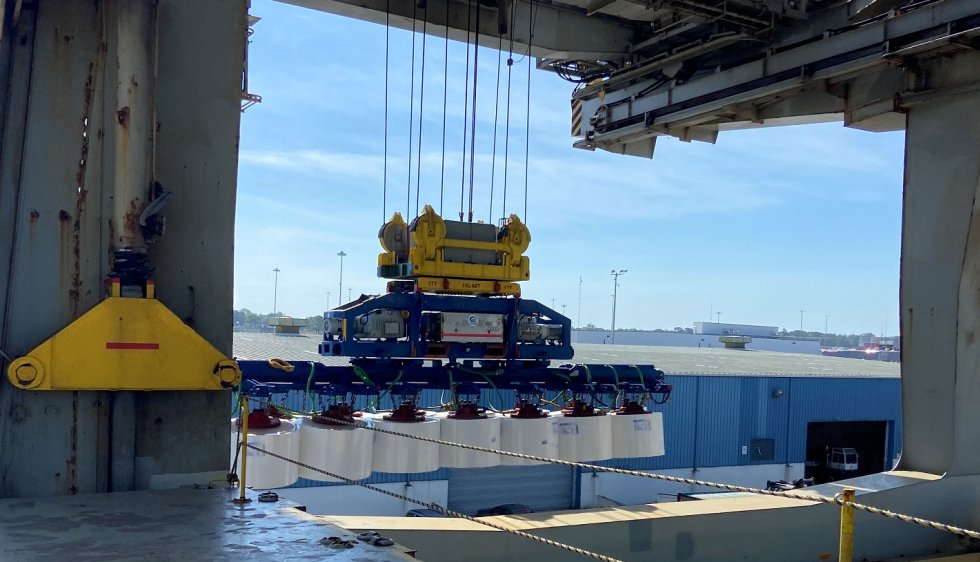|

Spotlight: Domtar’s Supply Chain & Transportation Logistics
Jan. 18, 2023 (Domtar - Industry Insights) - Many aspects of business changed when the global COVID-19 pandemic began almost three years ago — perhaps none more than supply chain and transportation logistics.
Our supply chain and transportation logistics professionals acted with agility and innovation to find new ways to get our customers their pulp products when every mode of transportation was bogged down, slowing the movement of goods throughout the world.
At Domtar, the shortage of vessel space, containers, rail cars and over-the-road trucks during and after the pandemic created new shipping challenges. Goods that couldn’t be shipped right away needed to be stored. At times, we held more than 100,000 tons of backlogged pulp product at our mills waiting to be exported.
Domtar Transportation Director Debbie Campbell and her team knew they had to think differently to get that product to customers.
In the last six months alone, the team reduced outstanding pulp backlog by more than 80 percent, restoring Domtar’s inventory back to pre-pandemic levels and, more importantly, getting product to customers.
“Capacity slowly started flowing again when consumers returned to spending their money on travel and services and less on material goods. It’s finally starting to realign with demand,” Campbell says. “But we had to put a lot of new processes in place to get through the excess pulp inventory that built up.”
The lessons learned through the pandemic have made our shipping processes more efficient going forward.
“Inventory reduction was key,” says Greg Linscott, pulp operations vice president. “Our customers needed product, and we needed to be able to get it to them. The transportation and logistics team did a great job working directly with our mill teams to find new ways to move product and reduce inventory backlogs.”
Thinking outside the (container) box at Plymouth
Between 85 and 90 percent of fluff pulp made at our Plymouth, North Carolina, mill is shipped overseas.
Pre-pandemic, Plymouth was considered the least complex mill from which to ship fluff pulp to customers overseas because of its nearness to the Port of Norfolk in Virginia. But during the pandemic, it was harder to secure space on vessels than ever.
Without reliable access to containers and vessels, Domtar could no longer rely on one port to accommodate its shipments.
Working directly with supply chain and transportation logistics professionals at the mill, as well as suppliers, the transportation team sought other options. They secured temporary warehouse space near alternate ports in Wilmington, North Carolina, and Savannah, Georgia. With product located at several different ports, the team could act quickly to get it on ships when containers came available, greatly increasing the likelihood of product reaching customers in a timely manner.
In unique cases the team used break-bulk freight to ship pulp to European customers. Instead of being loaded on the top of a ship in a container, the pulp is instead secured in the hull of the ship. When available, break-bulk ships are more versatile than container ships because they use different loading and off-loading ports.
Decoupling mill and port schedules at Marlboro
The Marlboro Mill in South Carolina faced some similar challenges. Before the pandemic, baled pulp bound to overseas customers from Marlboro was loaded into shipping containers, then trucked to port in Charleston.
But because of increasing variability in shipping schedules and port congestion, the process wasn’t meeting our needs. It became cumbersome to constantly schedule and reschedule shipments based on vessel availability. To eliminate the need to ship product only when vessels were available, the team partnered with a container depot near the port so that product could be shipped to the depot ahead of time. From there, our partners could load it into containers and take it to port when the vessel arrived.
“The process improvements we put in place because of the pandemic are things we never needed to think about before,” Campbell says. “But now that they’re a part of our normal operating procedure, we’re better prepared to handle supply chain disruptions that might happen in the future.”
SOURCE: Domtar |